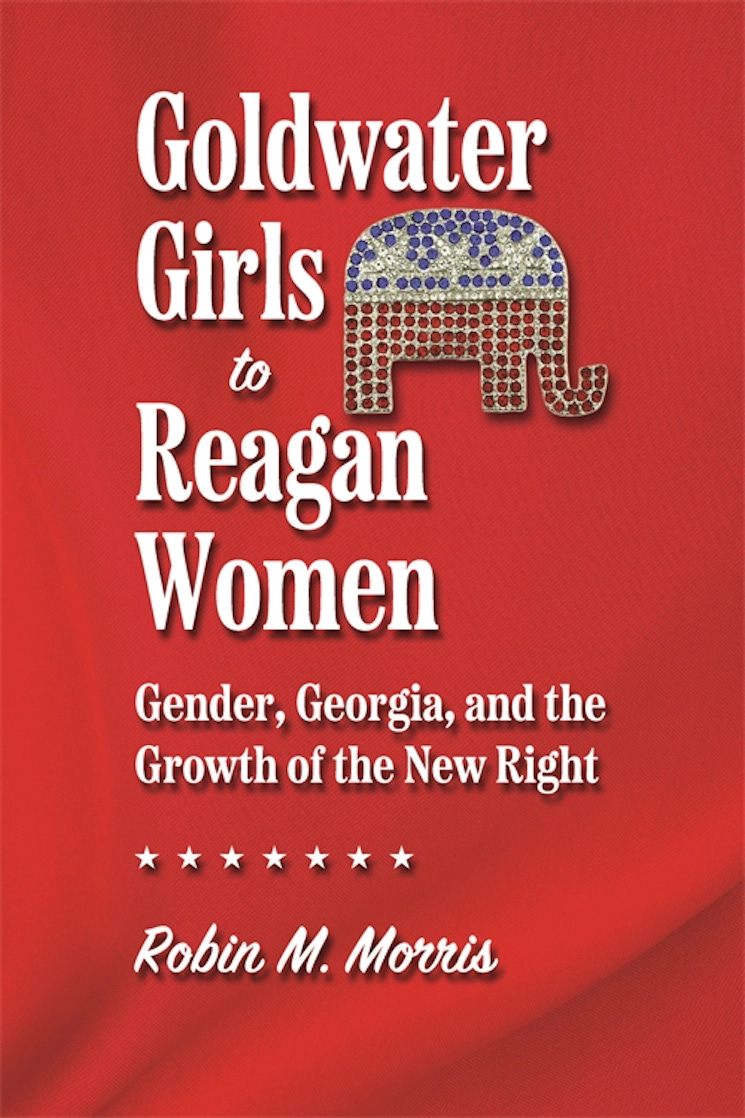Join me as I talk to Robin Morris, a historian at Agnes Scott College in Decatur, Georgia about her book, Goldwater Girls to Reagan Women: Gender, Georgia, and the Growth of the New Right (University of Georgia Press, 2022). Beginning with the African American club women who established the Georgia Federation of Republican Women, Robin shows us how these Black women lost their organization and the party to an ambitious cadre of white women who, in turn brought their brand of Republican conservatism to the Sunbelt South. Along the way, this “New Right” made Southern resistance to integration, sexual censorship, and populism not just respectable, but as American as apple pie.

Program Notes:
President Richard Nixon’s advice that aspiring politicians “choose the right wife” is taken from "A Visit with the First Lady," a one-hour special report by ABC News correspondent Virginia Sherwood, which aired on September 12, 1971. You can listen to the whole show here.
When either Robin or I refer to the “southern strategy,” we are talking about a plan that began as early as Herbert Hoover’s “Lily White” campaign in 1928 for Republicans to win national elections by wooing white voters in the South. Listeners might be interested in Angie Maxwell and Todd Shields’ book, The Long Southern Strategy: How Chasing White Voters in the South Changed American Politics (Oxford University Press, 2021).
One excellent account of how Black southerners lost the right to vote in the former Confederate states after 1877 is Glenda Gilmore, Gender and Jim Crow: Women and the Politics of White Supremacy in North Carolina, 1896-1920 (University of North Carolina Press, 1996).
I noted how few white women in Georgia voted for Stacy Abrams, and asked Robin if this was a legacy of the women’s political organizing that turned Georgia into a Republican-dominated state by the 1970s. For more on this topic, see Karen Attiah, “White Southern women are holding us back,” Washington Post, November 11, 2022.
Robin mentions the critical of African American women’s political clubs in maintaining a Black presence in southern politics. For more on the central role of Black women in American politics, see Martha Jones, Vanguard: How Black Women Broke Barriers, Won the Vote, and Insisted on Equality for All (Basic Books, 2020).
Robin discusses the importance of Barry Goldwater’s 1964 presidential campaign to a conservative takeover of the GOP. Listeners might also be interested in the California version of this story, recounted by Lisa McGirr in Suburban Warriors: The Origins of the New American Right (Princeton University Press, 2001).
The context for the growth of the GOP in Georgia was the large number of white people moving to the south for work, and the subsequent expansion of segregated suburban communities. Interested listeners might want to read Matthew D. Lassiter, The Silent Majority: Suburban Politics in the Sunbelt South (Princeton University Press, 2006).
Robin mentions Operation Lend an Ear: she gave a whole talk about this Republican recruiting effort at Emory University on September 20, 2020. You can listen here.
In discussing the importance of Atlanta to modern African American politics, Robin namechecks Maurice J. Hobson’s The Legend of the Black Mecca: Politics and Class in the Making of Modern Atlanta (University of North Carolina, 2019).
Robin also mentions a television miniseries about Phyllis Schlafly, “Mrs. America” (FX, 2020). You can binge it here.
The Phyllis Schlafly audio clip was taken from a debate between Schlafly and Betty Friedan, ABC’s Good Morning America on January 28, 1976. Go here to listen to the full debate.
Robin and I discussed the importance of the mailing list to the rise of the New Right. You can read more about that in Chapter 2 of my most recent book, Political Junkies: From Talk Radio to Twitter, How Alternative Media Hooked Us on Politics and Broke Our Democracy (Basic Books, 2020).
Brittney Griner follow-ups:
At the New Yorker, Jelani Cobb asks readers to think about how race and racism operate in American foreign policy. Brittney Griner’s captivity had such power in part, Cobb says, because “inequality, or even the appearance of inequality, is not only a liability at home but an impediment in foreign affairs. The irony is that Putin, in the most cynical way possible, has demonstrated that Black lives really do matter, by highlighting just how much you can achieve by placing one in jeopardy.” (December 17, 2022)
What should Griner’s unjust captivity in Russia teach us? The United States is also ruining lives by incarcerating thousands of people yearly on minor drug charges, and in conditions that are inhumane. “There’s plenty to be outraged about concerning Griner’s treatment and plenty more to celebrate now that she is free. But it’s striking how aptly her conditions could describe those in the U.S.,” New York magazine’s Zak Cheney-Rice points out. “Poorly compensated labor, overcrowding, squalid housing, solitary confinement, mental stability pushed to the breaking point, mounting hopelessness — all par for the course in the land of San Quentin and Parchman Farm. (December 16, 2022)
















Share this post